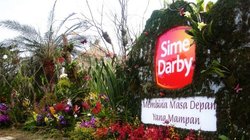Reuters | 24 February
SIME Darby, the world's biggest listed palm oil firm, is on the lookout for more land, its chief executive said yesterday, in a move sure to fuel the global grab for arable land as food prices remain high.
Sime Darby is going on its hunt at a time of high palm oil prices - they stood at RM3,967 in early February, just 12 per cent off a 2008 record - though the market has recently retreated on fears Middle East unrest will slow economic growth.
During the 2007-2008 food price surge, resource firms from Saudi Arabia to South Korea scoured the world for agricultural land to boost supplies and profit from growing food demand.
Much of the focus for oil palm expansion will remain on Indonesia, the world's No.1 producer, although plans for a ban on forest clearing and legal hurdles over land acquisitions have prompted planters to also turn to Africa.
"Sime Darby is always open to any propositions to expand its oil palm investment in Indonesia, both via greenfield and brownfield," Mohd Bakke Salleh, Sime Darby's president and group chief executive officer, told Reuters in an email interview.
Sime Darby, valued at US$18 billion (RM54.90 billion) by market capitalisation, has the largest land holdings among palm oil firms. It has added three new estates to its Indonesian portfolio in the current fiscal year, Bakke said.
The company still has 40,000 hectares of vacant land in Indonesia after planting 208,049 hectares, which represents almost 40 per cent of its total planted Southeast Asian holdings.
The company, which is due to announce its second quarter results today, is expected to report a net profit of RM3.2 billion for the 2011 fiscal year, according to 26 analysts tracked by Thomson Reuters.
Its plantation arm contributed about a third of the group's revenue in fiscal 2010. Most analysts regard plantations as the crown jewel in Sime Darby's business, which spans motoring, property, energy and utilities.
Officials have taken steps to preserve cash flow and allow for more board oversight after mismanagement at its energy division led to two quarters of losses in fiscal 2010.
Bakke, who replaced the former chief executive after heavy losses in the energy business, said prolonged unfavourable weather conditions would affect supply and prices would remain attractive for planters.
Palm oil hit a three-year high in early February after floods hit key growing regions in Malaysia, the world's No.2 producer, and triggered fears that importers would rush to stockpile.
"(But) the normal upward crop cycle in the second half of 2011 and new maturity areas in Indonesia... may lead to price stability or adjustment from the present level," Bakke said ahead of the Bursa Malaysia Palm Oil Conference in March.
Sime Darby expects its palm fresh fruit bunch production to be within 10 million tonnes for the 2011 fiscal year, up 1.6 per cent, from a year ago.
Its shares have gained about 4 per cent since the start of the year, outperforming rival Wilmar International's 8 per cent fall and the near 1 per cent loss in Malaysia's benchmark stock index.
Singapore's Wilmar, which earns more than half of its revenue from China, reported a 28 per cent decline in quarterly earnings yesterday, thanks to losses from its oilseeds and grains units, missing forecasts and knocking its shares down 5 per cent.
Sime Darby is tapping into a concession pact in Liberia to expand, while other firms such as Wilmar, Golden Agri-Resources and Olam have said they want to grow their oil palm estates in Africa. - Reuters













